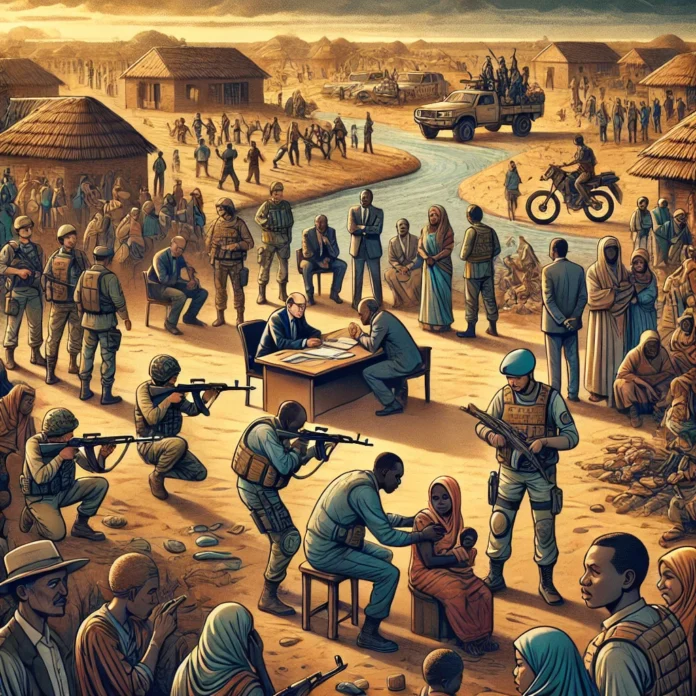Security challenges and localized conflicts are major issues impacting communities worldwide, affecting everything from daily safety to regional stability. These conflicts, often emerging from ethnic, political, or resource-driven tensions, pose unique risks that require a combination of short-term crisis management and long-term structural reform. In this article, we explore the root causes of these conflicts, examine their impacts on communities, and discuss solutions that may help build more peaceful and resilient societies.
Root Causes of Security Challenges and Localized Conflicts
1.Resource Scarcity and Competition: One common trigger of localized conflicts is competition over natural resources. In regions with limited access to water, land, or minerals, communities often find themselves vying for control of these valuable resources. Environmental changes such as droughts and floods can exacerbate this issue, leading to displacement and heightened competition for what remains.
2.Ethnic and Cultural Divides: Many localized conflicts stem from longstanding ethnic, religious, or cultural differences. These tensions can become flashpoints for violence, particularly in areas where one group feels marginalized or discriminated against by the government or other groups. Historical grievances and collective memories of past injustices can intensify these divides.
3.Political Instability and Corruption: Weak governance and corrupt practices often exacerbate security issues. In areas where citizens do not trust their government or view it as self-serving, there is a higher risk of localized conflicts as communities may take justice into their own hands. Inequitable resource distribution, election violence, and impunity for crime all erode social trust and make violent conflict more likely.
4.Youth Unemployment and Marginalization: With high levels of youth unemployment, many young people are vulnerable to recruitment by armed groups, insurgencies, or criminal organizations. Lacking opportunities, they may turn to violence or crime to provide for themselves and their families, leading to increased violence and instability.
5.External Influences and Proxy Wars: In some regions, foreign actors play a role in fueling localized conflicts. By providing funding, arms, or ideological support to local factions, these external forces can intensify conflicts, creating a cycle of violence that is difficult to break.
Impacts of Localized Conflicts on Communities
Localized conflicts profoundly impact communities, creating lasting social, economic, and psychological scars.
1.Displacement and Refugee Crises: One of the most immediate effects of localized conflict is forced displacement. When people are driven from their homes due to violence or resource scarcity, they often end up in overcrowded camps or neighboring cities, straining resources in these areas and increasing the potential for further conflicts.
2.Economic Decline: Conflict zones experience significant economic downturns as businesses close, infrastructure deteriorates, and investment dries up. Local industries suffer from disruptions to transportation networks, and the agricultural sector, often the backbone of rural communities, is devastated by land access issues and labor shortages.
3.Education Disruption: In areas facing conflict, children and young adults often lose access to education, either due to insecurity or because schools are destroyed or repurposed. The lack of educational opportunities perpetuates poverty cycles, making it harder for the next generation to break free from the challenges that fueled the conflict initially.
4.Psychological Trauma: The emotional toll of localized conflicts is profound. Many individuals experience trauma from witnessing violence, losing family members, or enduring personal attacks. This trauma, often untreated, can have long-term effects on mental health, affecting generations and making post-conflict reconciliation challenging.
Strategies for Addressing Localized Conflicts
1.Inclusive Governance and Social Reform: Governments need to adopt inclusive policies that ensure equal representation and resource distribution among all ethnic and social groups. Effective local governance that addresses community needs is essential in building trust and preventing conflicts.
2.Conflict Mediation and Peacebuilding Initiatives: Establishing community-led peace initiatives can create forums for open dialogue, allowing conflicting parties to voice grievances and work towards mutual understanding. These initiatives may involve local leaders, NGOs, and international mediators who focus on building common ground and addressing root causes of conflict.
3.Economic and Educational Development: Long-term stability is often achieved by addressing economic and social inequalities. Providing job opportunities and vocational training, especially to youth, can help reduce recruitment into violent groups. Education initiatives that promote tolerance and mutual respect are also crucial.
4.Environmental and Resource Management: Proper management of natural resources can help mitigate many conflicts that arise over scarcity. Governments and NGOs can work together to develop sustainable agricultural practices, improve water management, and implement fair land distribution policies.
5.Strengthening Security and Law Enforcement: Effective policing and judiciary systems are essential in maintaining law and order. However, it is equally important for security forces to gain the trust of local communities, which requires training in human rights and community engagement.
6.Addressing the Role of External Actors: International organizations and governments must work together to discourage external influences from fueling local conflicts. Transparent discussions about the role of foreign aid and arms trafficking can help build international consensus on promoting peace rather than division.
Conclusion
Localized conflicts and security challenges are complex issues that cannot be solved overnight. They require a nuanced understanding of local conditions, deep-rooted causes, and collective action that spans from government agencies to community members. Through efforts that address both immediate needs and underlying causes, societies can build more resilient communities and create an environment where peace and security flourish.




















